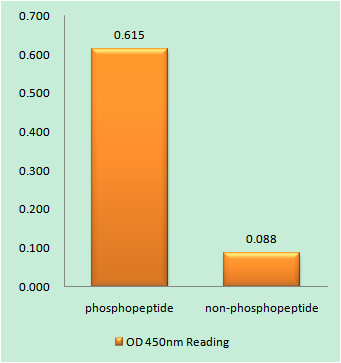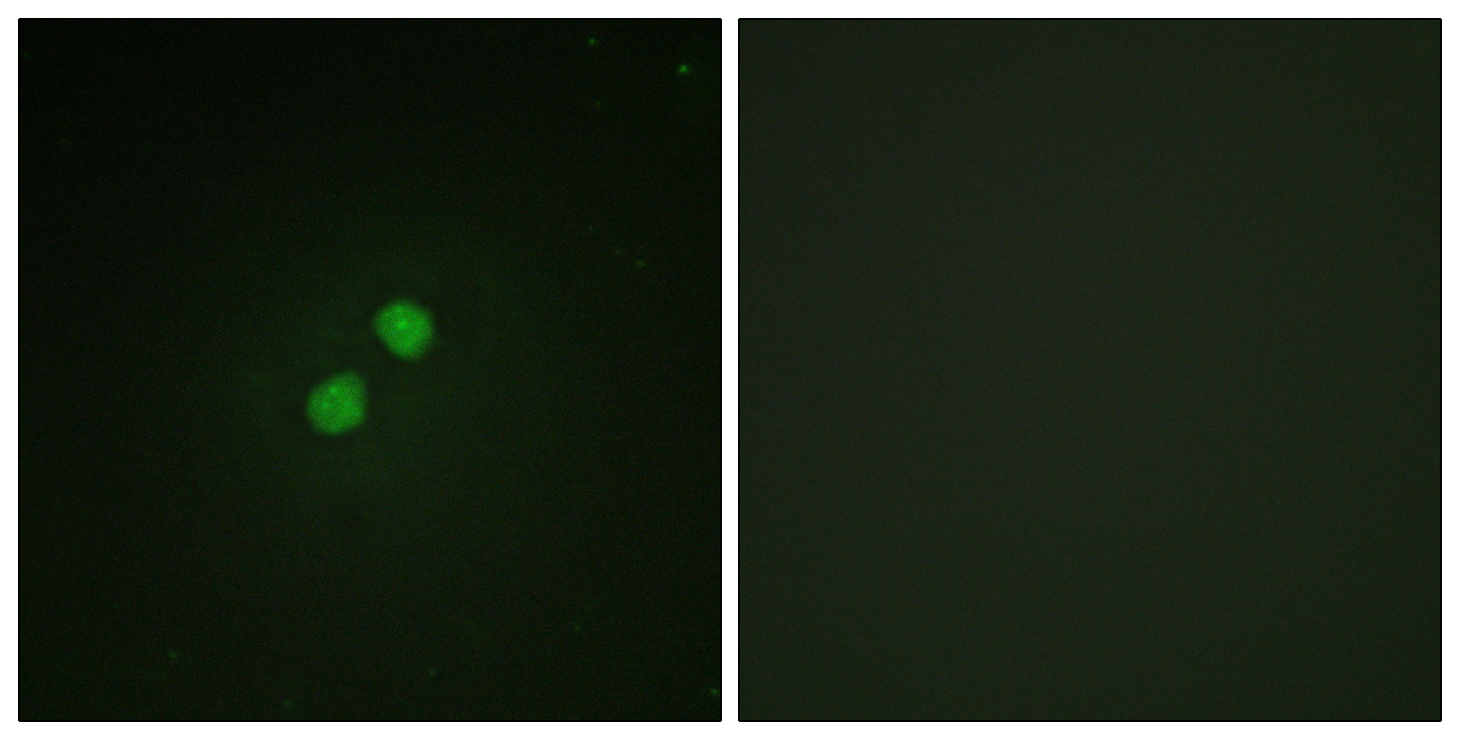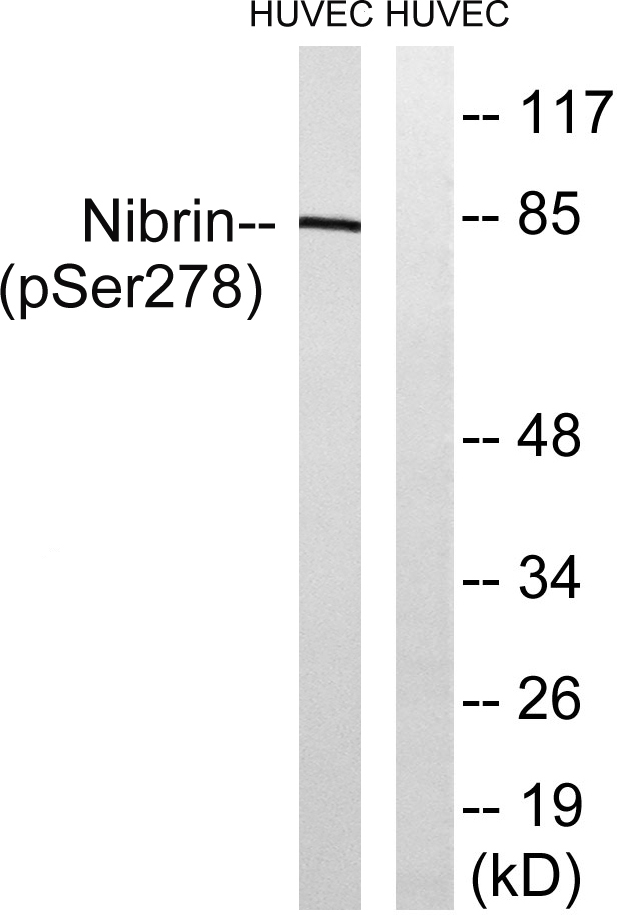Nibrin (phospho Ser278) Polyclonal Antibody
- Catalog No.:YP0567
- Applications:WB;IF;ELISA
- Reactivity:Human;Rat;Mouse;
- Target:
- Nibrin
- Fields:
- >>Homologous recombination;>>Cellular senescence
- Gene Name:
- NBN
- Protein Name:
- Nibrin
- Human Gene Id:
- 4683
- Human Swiss Prot No:
- O60934
- Mouse Swiss Prot No:
- Q9R207
- Immunogen:
- The antiserum was produced against synthesized peptide derived from human Nibrin around the phosphorylation site of Ser278. AA range:251-300
- Specificity:
- Phospho-Nibrin (S278) Polyclonal Antibody detects endogenous levels of Nibrin protein only when phosphorylated at S278.
- Formulation:
- Liquid in PBS containing 50% glycerol, 0.5% BSA and 0.02% sodium azide.
- Source:
- Polyclonal, Rabbit,IgG
- Dilution:
- WB 1:500 - 1:2000. IF 1:200 - 1:1000. ELISA: 1:10000. Not yet tested in other applications.
- Purification:
- The antibody was affinity-purified from rabbit antiserum by affinity-chromatography using epitope-specific immunogen.
- Concentration:
- 1 mg/ml
- Storage Stability:
- -15°C to -25°C/1 year(Do not lower than -25°C)
- Other Name:
- NBN;NBS;NBS1;P95;Nibrin;Cell cycle regulatory protein p95;Nijmegen breakage syndrome protein 1
- Observed Band(KD):
- 95kD
- Background:
- Mutations in this gene are associated with Nijmegen breakage syndrome, an autosomal recessive chromosomal instability syndrome characterized by microcephaly, growth retardation, immunodeficiency, and cancer predisposition. The encoded protein is a member of the MRE11/RAD50 double-strand break repair complex which consists of 5 proteins. This gene product is thought to be involved in DNA double-strand break repair and DNA damage-induced checkpoint activation. [provided by RefSeq, Jul 2008],
- Function:
- disease:Defects in NBN are a cause of genetic susceptibility to breast cancer (BC) [MIM:114480]. BC is an extremely common malignancy, affecting one in eight women during their lifetime. A positive family history has been identified as major contributor to risk of development of the disease, and this link is striking for early-onset breast cancer.,disease:Defects in NBN are the cause of Nijmegen breakage syndrome (NBS) [MIM:251260]. NBS is an autosomal recessive syndrome characterized by chromosomal instability, radiation sensitivity, microcephaly, growth retardation, immunodeficiency and predisposition to cancer, particularly to lymphoid malignancies.,disease:Defects in NBN may be associated with aplastic anemia [MIM:609135]. Aplastic anemia is a disease of bone-marrow failure characterized by peripheral pancytopenia and marrow hypoplasia. Most of the cases of aplastic anemia are idiopa
- Subcellular Location:
- Nucleus . Nucleus, PML body . Chromosome, telomere . Chromosome . Localizes to discrete nuclear foci after treatment with genotoxic agents (PubMed:26438602, PubMed:10783165, PubMed:26215093). Acetylation of 'Lys-5' of histone H2AX (H2AXK5ac) promotes NBN/NBS1 assembly at the sites of DNA damage (PubMed:26438602). .
- Expression:
- Ubiquitous (PubMed:9590180). Expressed at high levels in testis (PubMed:9590180).
- June 19-2018
- WESTERN IMMUNOBLOTTING PROTOCOL
- June 19-2018
- IMMUNOHISTOCHEMISTRY-PARAFFIN PROTOCOL
- June 19-2018
- IMMUNOFLUORESCENCE PROTOCOL
- September 08-2020
- FLOW-CYTOMEYRT-PROTOCOL
- May 20-2022
- Cell-Based ELISA│解您多样本WB检测之困扰
- July 13-2018
- CELL-BASED-ELISA-PROTOCOL-FOR-ACETYL-PROTEIN
- July 13-2018
- CELL-BASED-ELISA-PROTOCOL-FOR-PHOSPHO-PROTEIN
- July 13-2018
- Antibody-FAQs
- Products Images

- Enzyme-Linked Immunosorbent Assay (Phospho-ELISA) for Immunogen Phosphopeptide (Phospho-left) and Non-Phosphopeptide (Phospho-right), using Nibrin (Phospho-Ser278) Antibody

- Immunofluorescence analysis of NIH/3T3 cells, using Nibrin (Phospho-Ser278) Antibody. The picture on the right is blocked with the phospho peptide.

- Western blot analysis of lysates from HUVEC cells treated with Forskolin 40nM 30', using Nibrin (Phospho-Ser278) Antibody. The lane on the right is blocked with the phospho peptide.



